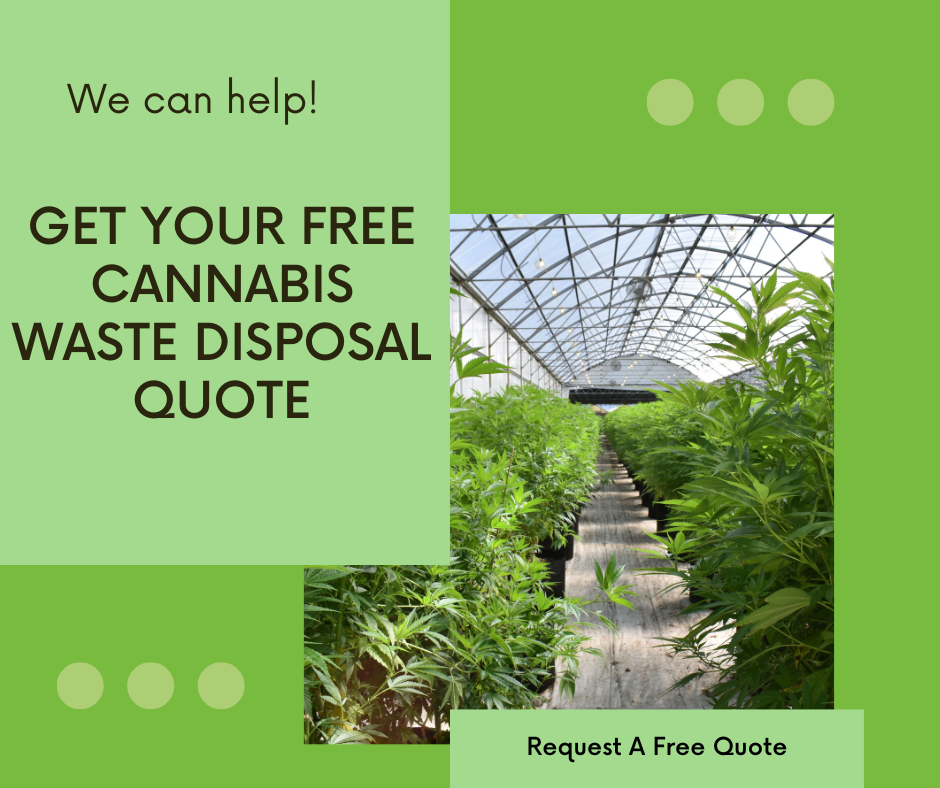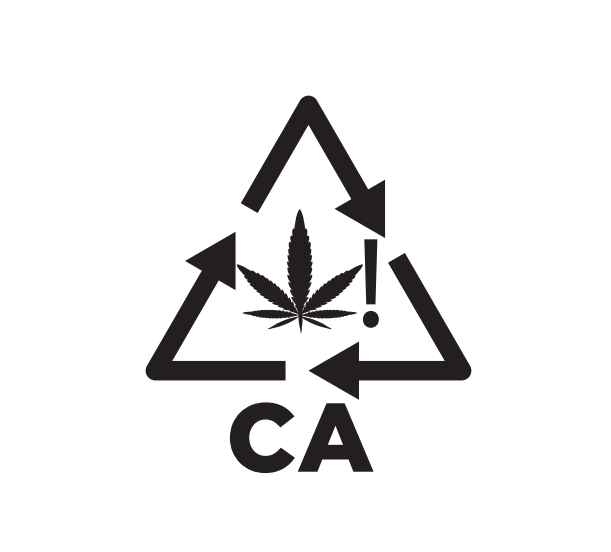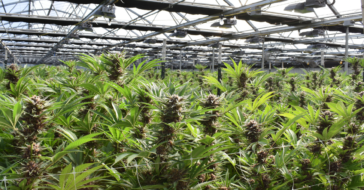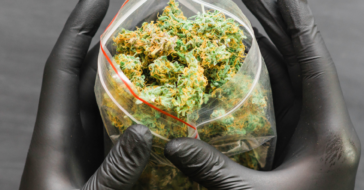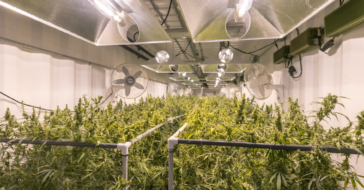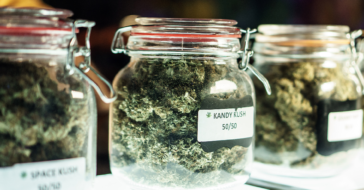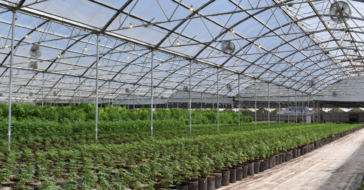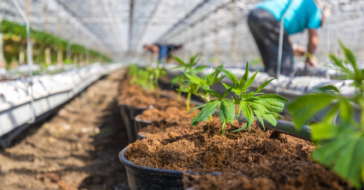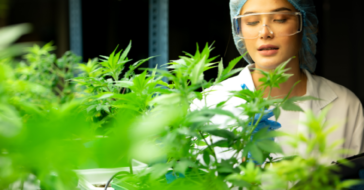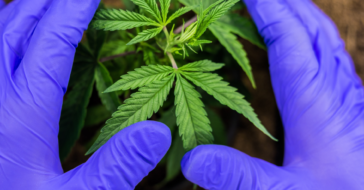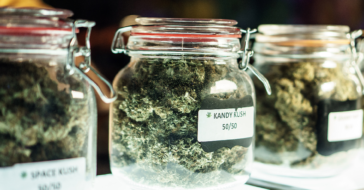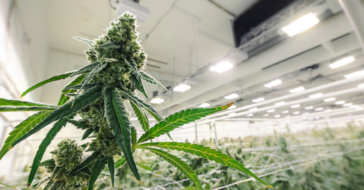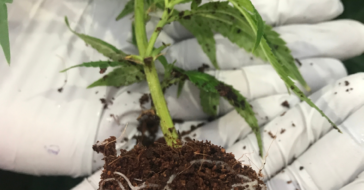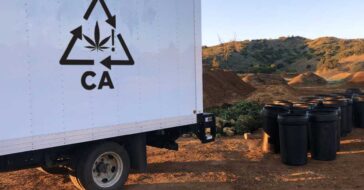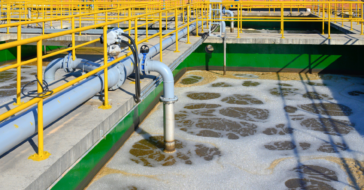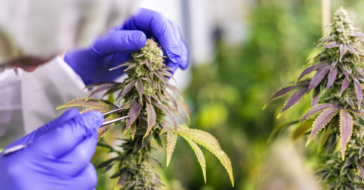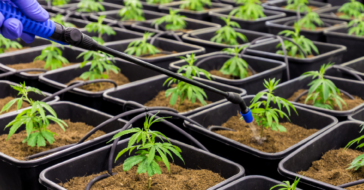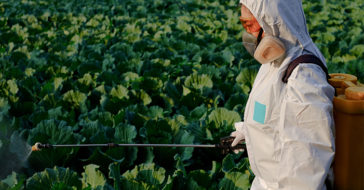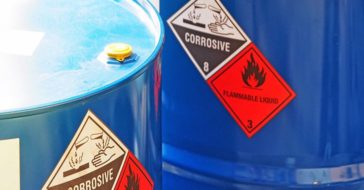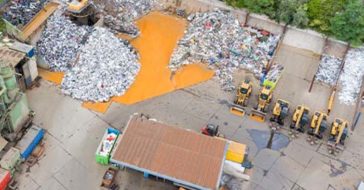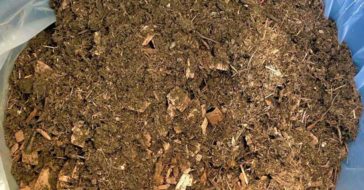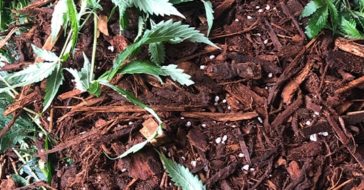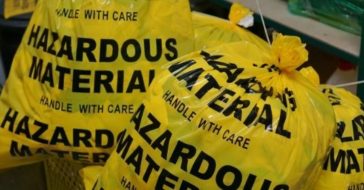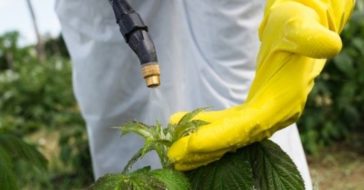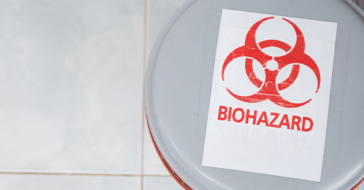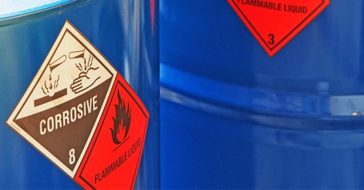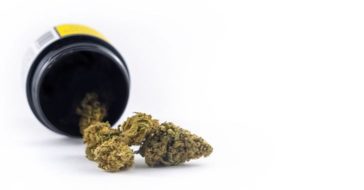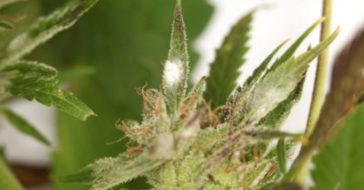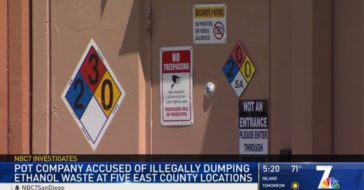Burgeoning with innovation and growth, the cannabis industry must consistently overcome a unique challenge: the responsible disposal of waste.
From cultivation to distribution, cannabis companies generate diverse waste streams that include everything from plant waste to hazardous byproducts and nonhazardous packaging.
In this dynamic landscape, adopting best practices in waste disposal is critical to fostering a sustainable and compliant business. Here are five best waste disposal practices for your cannabis company:
- Separate and secure your waste.
- Render waste unusable.
- Continually track CCTT requirements.
- Keep assessing your waste management practices.
- Work with trusted partners.
Separate And Secure Your Waste
Cannabis waste isn’t just one waste stream. There are several types of waste streams cannabis companies generate. Each waste type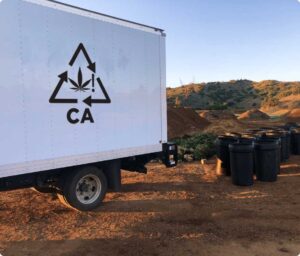 includes a set of regulatory requirements that cannabis businesses must follow.
includes a set of regulatory requirements that cannabis businesses must follow.
For example, some of the different cannabis waste materials include:
- Plant waste, such as leaves, stems and roots
- Manufacturing waste generated during the extraction, distillation and refinement of cannabis products
- Soil waste, which could be contaminated with pesticides or other chemicals
- Packaging waste, which includes packaging materials like plastic containers and cardboard waste
- Extraction byproducts like solvents and other plant material
- Lab waste, including containers and tools used in quality control
- Expired or unused materials like chemicals or cannabis products
- Wastewater, which may require specialized disposal by waste water treatment companies
While some waste streams are non-hazardous, others are hazardous. In California, even most types of electronic waste have hazardous components.
If you generate cannabis waste of ANY TYPE, it’s important to separate each of these waste streams to meet all disposal requirements. Mixing waste streams can lead to fines and hazardous working conditions for individuals who dispose of the waste.
As you separate your waste, use designated waste containers that are clearly labeled and kept in a secure location as you prepare your waste for transportation to a disposal facility. Employees should know which containers are designated for cannabis waste and which are considered hazardous.
The best cannabis waste disposal companies will provide you with UN-rated containers to ensure the secure handling of your waste. UN-rated containers are air-tight and offer maximum odor protection.
Your containers should also include biodegradable lining to ensure proper hygiene and meet state regulations to prevent dolor and spillage. Cannabis materials can emit strong odors, which may lead to complaints and subsequent violations.
Render Waste Unusable
One of the most important best practices for cannabis waste disposal involves rendering certain types of waste unusable. The law requires that any type of cannabis waste that comes in contact with THC at the end of the waste management process must be rendered unusable and unrecognizable.
What does this process entail? Prior to disposing of your cannabis waste, you must ensure all cannabis plant materials and by-products are deconstructed so that nobody can tell what the material is and that they are destroyed so that nobody can consume or use the material.
In addition to, at the end of the waste management process, there are defined times when cannabis waste must be rendered unrecognizable and unusable. Here are some examples of when this process must occur:
- When cannabis flowers or products don’t meet testing or quality requirements
- Recalled cannabis flowers or products after a minimum 72-hour quarantine prior to disposal
- Samples held by licensed testing laboratories after at least 45 business days after analysis
All rendering of cannabis flowers and products must be done under video surveillance unless the licensee performs the rendering during active cultivation activities on the premises licensed exclusively for cultivation.
It’s important to note that rendering cannabis waste unusable or unrecognizable isn’t clearly defined, which can make a decision on how to perform this process uncertain. While some companies may use approved detergent or grease over the waste so that it can’t be used, others might grind the materials and blend them with non-consumable solid waste.
Working with an experienced cannabis waste management company can help ensure you meet these laws and clarify any business requirements.
Continually Track CCTT Requirements
Another best waste disposal practice involves your California Cannabis Track-and-Trace (CCTT) requirements. These track-and-trace rules require that you record and track information related to your cannabis inventory. Also known as “seed to sale” reporting, this system tracks cannabis products through the supply chain, from cultivation to the sale of products.
requirements. These track-and-trace rules require that you record and track information related to your cannabis inventory. Also known as “seed to sale” reporting, this system tracks cannabis products through the supply chain, from cultivation to the sale of products.
The primary goal of the CCTT is to ensure transparency, accountability and regulatory compliance within the state’s cannabis industry. Ensuring that you have the most up-to-date software in place is a critical best practice in order to track the lifecycle of cannabis products successfully.
Key areas that your tracking system should include are:
- Cultivation tracking
- Harvest and processing
- Distribution
- Transportation
- Sales and retail
- Reporting and compliance
- Recalls and safety
- Waste removal
To use the system, you must assign a nonrepeating unique identifier (UID) to each immature lot, flowering plant or distinct cannabis product.
As a cannabis waste generator, it’s critical to ensure you are meeting all regulations included in the state’s CCTT. This includes creating a detailed cannabis waste management plan, which requires that you address all areas of your waste disposal, even if you are disposing of non-hazardous cannabis waste on-site through methods like composting or mulching.
If transporting your waste off-site, your plan should include details like which waste receptacles you use and the security of those containers.
Remember that CCTT regulations are constantly evolving. Another important best practice to continually stay on top of these regulations to ensure you are meeting them.
For example, as of now, temporary cannabis licensees are not required to use the CCTT system. In fact, any business with a temporary cannabis license will not be able to access it. Instead, you must document all sales and transfers manually through paper sales invoices or shipping manifests, according to the California Department of Food and Agriculture.
Keep Assessing Your Waste Management Practices
Sustainability in waste management isn’t a one-time effort. It’s an ongoing commitment that demands continual assessment and improvement. For cannabis companies, maintaining an environmentally conscious approach requires consistent evaluation of waste management practices to adapt to evolving regulations, technological advancements and industry standards.
Here are some methods you can use to assess your waste management practices continually:
Regular Audits and Reviews
Periodic audits of waste management processes are essential to identify inefficiencies, areas for improvement and compliance gaps. These audits should encompass all stages of the cannabis production chain, from cultivation and extraction to packaging and distribution. By conducting regular reviews, companies can pinpoint specific areas needing attention and implement targeted solutions.
improvement and compliance gaps. These audits should encompass all stages of the cannabis production chain, from cultivation and extraction to packaging and distribution. By conducting regular reviews, companies can pinpoint specific areas needing attention and implement targeted solutions.
Compliance Monitoring and Adaptation
As regulations surrounding cannabis waste disposal frequently evolve, staying compliant is imperative. Companies must stay on top of local, state and federal regulations governing waste disposal. This involves not only adhering to existing rules but also adapting swiftly to new mandates or revised guidelines. Maintaining compliance not only ensures legality but also fosters a positive corporate image.
Technology Integration and Innovation
The landscape of waste management technologies is continually evolving. Cannabis companies should actively explore and integrate innovative technologies that enhance waste disposal practices. Whether it involves advancements in composting, waste-to-energy conversion or eco-friendly packaging solutions, embracing technology can lead to more efficient and sustainable waste management strategies.
Employee Training and Engagement
Employee involvement is pivotal in successful waste management practices. Regular training sessions and workshops can keep staff informed about proper waste disposal procedures, emphasizing the importance of segregating different types of waste and adhering to company policies. Encouraging suggestions for improvement from your employees can also yield valuable insights.
Benchmarking and Performance Measurement
Establishing benchmarks and key performance indicators (KPIs) helps in quantifying waste reduction goals and measuring progress over time. Metrics like waste diversion rates, percentage reduction in landfill-bound waste or improved recycling rates can provide valuable insights into the effectiveness of implemented waste management strategies.
Work With Trusted Partners
Collaborating with reputable and specialized cannabis waste disposal companies is instrumental in ensuring compliant, efficient and environmentally responsible waste management. A critical best practice is to choose a cannabis waste disposal company that has experience in disposing of the type of waste you generate and has a reputation for securing the safe disposal of cannabis waste.
When searching for a long-term trusted partner, look for:
- Expertise in Regulatory Compliance: Cannabis waste disposal companies possess in-depth knowledge of the intricate regulations governing cannabis waste. Their expertise ensures that disposal methods align with local, state and federal laws, reducing the risk of non-compliance penalties for cannabis businesses.
- Tailored Solutions for Cannabis Waste: Unlike generic waste management services, specialized companies focus on the unique requirements of cannabis waste disposal. They offer tailored solutions catering specifically to the diverse types of waste generated in cultivation, processing and retail operations.
- Proper Handling of Hazardous Waste: Certain byproducts of cannabis cultivation and production, such as residual solvents or contaminated materials, may be classified as hazardous waste. Certified disposal companies have the expertise and resources to handle and dispose of these hazardous materials safely and legally.
- Sustainable and Environmentally Conscious Practices: Partnering with reputable waste disposal companies ensures that waste is managed in a manner that prioritizes sustainability. These companies often emphasize eco-friendly methods, such as composting, recycling or converting waste into usable energy, minimizing the environmental impact.
- Comprehensive Services and Documentation: Specialized disposal firms offer end-to-end services, from collection and transportation to disposal and documentation. They ensure proper handling, segregation and reporting of cannabis waste, maintaining detailed records required for regulatory compliance.
- Mitigating Risk and Liability: By entrusting waste management to professionals, cannabis companies mitigate potential risks and liabilities associated with improper waste disposal. Reliable partners safeguard businesses from legal issues and reputational damage that can arise from mishandling waste.
Partnering with established and knowledgeable cannabis waste disposal companies is a proactive step toward ensuring compliant, ethical and efficient waste management practices. Their expertise, tailored solutions and commitment to sustainability can significantly benefit cannabis businesses while fostering a responsible industry image.
